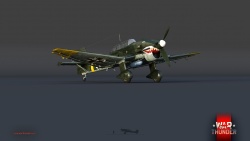Difference between revisions of "Ju 87 B-2"
Inceptor57 (talk | contribs) m (→IGD (Intentional Gear Destruction)) |
Inceptor57 (talk | contribs) m (→IGD (Intentional Gear Destruction)) |
||
| Line 173: | Line 173: | ||
===IGD (Intentional Gear Destruction)=== | ===IGD (Intentional Gear Destruction)=== | ||
| − | Due to the high parasite drag imposed by fixed landing gear spats, the planes top speed and performance are hindered. No Stuka's landing gear | + | Due to the high parasite drag imposed by fixed landing gear spats, the planes top speed and performance are hindered. No Stuka's landing gear is retractable. For maximum performance of the plane, one can destroy the gear by touching them to a body of water (not rough, but flat and calm). To do this, swoop low, and reduce airspeed to around 210 km/h (160 mph). Next, slowly near the water at an angle of attack of 10 degrees or more. Once you hear a snap, or see the gear come off, pull up immediately to avoid breaking the engine. |
;Effects on performance due to IGD | ;Effects on performance due to IGD | ||
Revision as of 08:49, 12 December 2019
Contents
| This page is about the German dive bomber Ju 87 B-2. For other uses, see Ju 87 (Family). |
Description
The Ju 87 B-2 is a rank I German dive bomber
with a battle rating of 1.3 (AB/SB) and 1.0 (RB). This dive bomber has been in the game since the start of the Open Beta Test prior to Update 1.27.
General info
Flight Performance
Describe how the aircraft behaves in the air. Speed, manoeuvrability, acceleration and allowable loads - these are the most important characteristics of the vehicle.
| Characteristics | |||||||
|---|---|---|---|---|---|---|---|
| Stock | |||||||
| Max Speed (km/h at 4,100 m) |
Max altitude (meters) |
Turn time (seconds) |
Rate of climb (meters/second) |
Take-off run (meters) | |||
| AB | RB | AB | RB | AB | RB | ||
| 367 | 356 | 7000 | 28.1 | 29.2 | 2.5 | 2.5 | 434 |
| Upgraded | |||||||
| Max Speed (km/h at 4,100 m) |
Max altitude (meters) |
Turn time (seconds) |
Rate of climb (meters/second) |
Take-off run (meters) | |||
| AB | RB | AB | RB | AB | RB | ||
| 403 | 383 | 7000 | 25.9 | 27.0 | 9.9 | 5.6 | 434 |
Details
| Features | ||||
|---|---|---|---|---|
| Combat flaps | Take-off flaps | Landing flaps | Air brakes | Arrestor gear |
| X | ✓ | ✓ | ✓ | X |
| Limits | ||||
|---|---|---|---|---|
| Wing-break speed (km/h) |
Gear limit (km/h) |
Combat flaps (km/h) |
Max Static G | |
| + | - | |||
| 520 | ~18 | ~7 | ||
| Optimal velocities | |||
|---|---|---|---|
| Ailerons (km/h) |
Rudder (km/h) |
Elevators (km/h) |
Radiator (km/h) |
| < 250 | < 350 | < 350 | > 280 |
| Compressor (RB/SB) | ||
|---|---|---|
| Setting 1 | ||
| Optimal altitude | 100% Engine power | WEP Engine power |
| 3,700 m | 930 hp | 1,199 hp |
Survivability and armour
- 5 mm Steel plate between pilot/gunner
- 8 mm Steel plate between pilot/gunner.
Armaments
Offensive armament
The Ju 87 B-2 is armed with:
- 2 x 7.92 mm MG 17 machine guns, wing-mounted (500 rpg = 1,000 total)
The two machine guns are arranged with one in each wing. Each machine gun is armed with the same amount of ammunition, which means both guns will fire together until empty.
Suspended armament
The Ju 87 B-2 can be outfitted with the following ordnance:
- 1 x 250 kg SC250JA bomb (250 kg total)
- 1 x 500 kg SC500K bomb (500 kg total)
- 1 x 250 kg SC250JA bomb + 4 x 50 kg SC50JA bombs (450 kg total)
Defensive armament
The Ju 87 B-2 is defended by:
- 1 x 7.92 mm MG 15 machine gun, dorsal turret (900 rpg)
Usage in battles
The main use of this plane is precision strikes on hard targets such as tanks and pillboxes, as well as providing ground support in ground battles. This is largely due to its spectacular dive-bombing accuracy and powerful payload. To perform an effective dive with this plane, at an altitude of at least 1400 m, place your target at the bend in your wings, roll your upside-down and dive at an angle of 60-90 degrees, aiming your crosshairs at or slightly in front of the target (leading with their speed). Drop throttle to 0% and deploy airbrakes (h key by default); you should keep a steady speed of 400 km/h (250 mph). During the dive, a siren activates at about < 2500 m, this is for aesthetic purposes and can hurt or help in different ways. Release your bomb at 300 m from the target and you should score a direct, or near direct hit.
The MG 17 allow for strafing runs on soft ground targets, while the bomb payload is sufficient for a heavy pillbox and a destroyer. The radio operator's defensive MG 15 is merely to scare away enemy fighters and is not a sufficient weapon for self-defence. The Stukas manoeuvrability however is!
Tactics
Arcade Battle: In AB you should concentrate on killing tanks and pillboxes first (if any) with your bombs, and use your offensive machine guns to kill soft targets like armoured cars, artillery, howitzers and AA. In this mode, you won't need your air brakes since you can't break your wings and its easy to pull up from a fast dive attack, and it's recommended that you keep as much of your speed up from the dives so you are harder to intercept by enemy aircraft.
Realistic Battle: In RB, you should keep your altitude, and look for tank columns to attack. Once you've chosen which tank column you wish to attack (ground targets as far from the battlefield or enemy airfield as possible are recommended, so you are less likely to be intercepted). Once you are right over your intended target, set your throttle to 0% and point your nose at the at the tank you want to destroy (since you have no bombsight, there will not be a bomb-drop indicator like in Arcade, and you will have to guess where the bombs will drop) once you are nearing your target, you will have to deploy your air-brakes or you won't be able to pull up at high speeds (You can tell when you are reaching a high speed with the sounds that the air and wings make). Once you drop your bomb(s) point your nose up to pull up. At this point you may or may not have killed your intended target, but it is OK if you did not, you will get better at it with more practice, but you still have your offensive armament to kill soft targets like AA or you can engage enemy fighters that are nearby (which is very likely).
Dog fighting the RB with Ju 87 is a very difficult task if the enemy knows your advantages and disadvantages and uses them to his advantage. Head-on attacks should be avoided as much as possible, for you do not have the armament to risk it. Also recommended is that you stay low and slow in a combat situation with enemy aircraft (because the Ju 87 has bad control ability at high speeds) and try to get the enemy to engage in a turn-fight. If he falls for your turn-fight, you should end up on his 6 o'clock in 3-5 turns on most enemies, it really depends on if it's a British, American or Russian plane, British being generally the better turn fighter. If he does not fall for your turn-fight, you are most likely going to go down...this plane is not a fighter plane.
The Ju-87 B-2 is very useful in tank RB (where with combined arms tanks and planes fight together) as just two of the 50 kg bombs can disable/destroy a tank if the land on target. As one of the bomb presets carries 4 x 50 kg bombs and 1 x 250 kg bomb this is probably the best use for the Stuka in its current BR (1.7) where heavy amour is not necessarily met regularly.
Other Notes: When returning to the base, landing and take-off are simple, and use of the airbrakes will help if you come in to fast to land. But you may be coming back on a dead or damaged engine (The Ju 87's engine is prone to damage and overheat) and it would help a lot if you find the nearest friendly airfield and get there as soon as possible.
Because of their low speed, permanent landing gear and reasonable durability, all the Ju 87 are quite good for capturing airfields in the Airfield Domination mode.
IGD (Intentional Gear Destruction)
Due to the high parasite drag imposed by fixed landing gear spats, the planes top speed and performance are hindered. No Stuka's landing gear is retractable. For maximum performance of the plane, one can destroy the gear by touching them to a body of water (not rough, but flat and calm). To do this, swoop low, and reduce airspeed to around 210 km/h (160 mph). Next, slowly near the water at an angle of attack of 10 degrees or more. Once you hear a snap, or see the gear come off, pull up immediately to avoid breaking the engine.
- Effects on performance due to IGD
Effects have been tested numerous times, but may vary based on payload, fuel, aircraft damage, etc.
- Airspeed: +30mph (50 kph) to max speed.
- Drag coefficient: -10-20% (numbers not exact)
- Weight: Negligible
- Turn Time: -2 sec
Manual Engine Control
| MEC elements | ||||||
|---|---|---|---|---|---|---|
| Mixer | Pitch | Radiator | Supercharger | Turbocharger | ||
| Oil | Water | Type | ||||
| Not controllable | Controllable Not auto controlled |
Controllable Not auto controlled |
Controllable Not auto controlled |
Separate | Not controllable 1 gear |
Not controllable |
Modules
| Tier | Flight performance | Survivability | Weaponry | ||
|---|---|---|---|---|---|
| I | Fuselage repair | Radiator | Offensive 7 mm | ||
| II | Compressor | Airframe | New 7 mm MGs | ETC 50/IV | |
| III | Wings repair | Engine | Turret 7 mm | ||
| IV | Engine injection | Cover | New 7 mm MGs (turret) | ||
Pros and cons
Pros:
- High bombing accuracy
- Easy to land
- Very useful as air support for ground forces battles
- Access to dive brakes
- Airframe can withstand some degree of damage
- Very high ammo count and high rate of fire for strafing ground targets
- High ROF for rear gunner, and is well protected
- Rear gunner is sometimes adequate to scare off some enemy fighters
- Features a lot of cool useful camouflages and all are available through destroying ground targets
- Can reliably engage enemy bombers when played on a tank battle
- Siren can act as a psychological attack against targeted enemies to force them from an offense into an evasive maneuvre
Cons:
- Poor climb rate
- Large radiator in the front and is easily damaged
- Cockpit is unarmoured from the front
- Defenseless against enemy fighters
- Slow
- Light bomb load
- Very light defensive armament.
- Siren increases drag
- Siren that activates in dives is very loud and can divert their attention over to you, especially enemy SPAA and fighters
- Siren can distract you if you're not used to it
- An animated bomb trapeze delays the bomb drop from pressing space (or whatever key is bound), which can make bombing runs harder (especially if used to other bombers)
History
Describe the history of the creation and combat usage of the aircraft in more detail than in the introduction. If the historical reference turns out to be too long, take it to a separate article, taking a link to the article about the vehicle and adding a block "/ History" (example: https://wiki.warthunder.com/(Vehicle-name)/History) and add a link to it here using the main template. Be sure to reference text and sources by using <ref></ref>, as well as adding them at the end of the article with <references />. This section may also include the vehicle's dev blog entry (if applicable) and the in-game encyclopedia description (under === Encyclopedia Info ===, also if applicable).
In-game description
The Junkers Ju 87 Stuka was a single-engine dive bomber and attack aircraft of the WWII era. The most famous Stuka pilot of the war was Hans-Ulrich Rudel, the most highly decorated Luftwaffe pilot in history. Despite its slow speed and mediocre aerodynamics (the landing gear was fixed), the Stuka was one of the most effective Luftwaffe aircraft early in the war due to its pin-point accuracy in a dive. The Ju 87 remains one of the most recognizable symbols of the Blitzkrieg.
The Stuka was an innovative design for its time, including such elements as automatic pull-up dive brakes which could recover the plane from a dive even if the pilot blacked out, and the infamous Jericho Trumpet sirens, activated by the airstream during the dive, which produced a demoralizing high-pitched whine. The Ju 87 B could carry up to 1,000 kg of bombs, but only without a rear gunner, and at a greatly reduced range.
Media
- Images
See also
Links to the articles on the War Thunder Wiki that you think will be useful for the reader, for example:
- reference to the series of the aircraft;
- links to approximate analogues of other nations and research trees.
External links
Paste links to sources and external resources, such as:
- topic on the official game forum;
- encyclopedia page on the aircraft;
- other literature.
| Germany bombers | |
|---|---|
| Arado | Ar 196 A-3 |
| Blohm & Voss | BV 138 C-1 · BV 238 |
| Dornier | Do 17 E-1 · Do 17 Z-2 · Do 217 E-2 · Do 217 E-4 · Do 217 K-1 · Do 217 M-1 |
| Focke-Wulf | Fw 189 A-1 · Fw 200 C-1 |
| Henschel | Hs 123 A-1 |
| Heinkel | He 111 H-3 · He 111 H-6 · He 111 H-16 · He 115 C-1 · He 177 A-3 · He 177 A-5 |
| Junkers | Ju 87 B-2 · Ju 87 R-2 · Ju 87 R-2 Libya · Ju 87 D-3 · Ju 87 D-5 · Ju 88 A-1 · Ju 88 A-4 · Ju 188 A-2 · Ju 288 C |
| Messerschmitt | Me 264 |
| Savoia-Marchetti | ▀S.M.79 serie 1 · ▀S.M.79 B · ▀S.M.79 serie 4 · ▀S.M.79 serie 8 |
| ▀S.M.79 AS · ▀S.M.79 bis/N · ▀S.M.79 bis/T.M | |
| Trophies | ▀Wellington Mk Ic |






